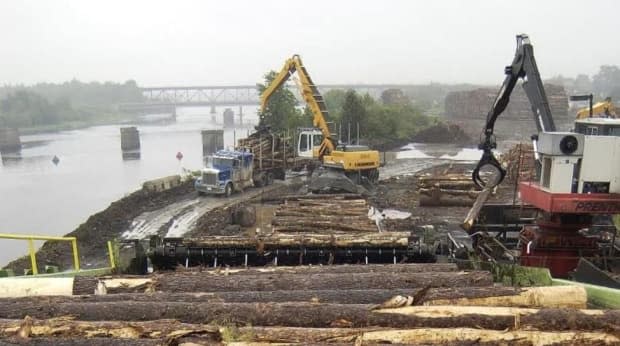New Brunswick hikes Crown timber fees 30 per cent

The fee forestry companies pay the New Brunswick government to harvest timber on Crown lands is set to go up by 30 per cent.
It's part of promised changes the province is making to its Crown timber royalty fee system, which are expected to result in an additional $50 million this fiscal year once it takes effect later this month, said Natural Resources and Energy Development Minister Mike Holland.
Holland had already revealed his change in direction on the issue of royalties, but the details had not been worked out.
"We haven't adjusted timber royalty rates in a number of years and this was an opportunity for us to apply a timber royalty rate that we feel fairly reflects the significant increase in the commodity pricing," he said Wednesday.
"And it will be part of a larger strategy to move towards legislation that creates fair market value and an upward adjustment based on commodity rates going forward."
The legislation is set to be passed this fall and implemented next April, and will give the province's Forest Products Commission the ability to conduct monthly fair market value surveys in order to keep a more "real-time" pulse on whether the Crown royalty fees are reasonable.
The legislation will also give the province the power to include additional "upward adjustments" on timber royalties based on commodity prices for lumber.

That extra revenue from the commodity price adjustment will be reinvested in the province's private woodlot sector through improvements to silviculture practices and providing better resources and education to those in the industry.
The move comes two years after the price of lumber spiked in 2020 and went on to peak in May 2021, leading to record profits for New Brunswick forestry companies.
However, while other provinces like Alberta and British Columbia increased the fees they charged companies for harvesting timber on their land, the province left its rate unchanged from where it was set in 2015.
That garnered criticism, particularly from private woodlot owners, who accused the province of essentially putting a ceiling on the price they were able to sell their timber to saw mills for.
Holland said he was aware of calls to tie royalty fees to lumber commodity prices, but said doing so could have "unintended consequences" if the price of lumber went back down.
"That's why we said we don't want to do something where if we put something in place that follows commodity pricing, where will it put us if the commodity pricing goes down?
"And so we said security, stability, surety is very important in this marketplace. So I was I was very clear that we weren't going to adopt a system that didn't have the ability to provide that stability."
As for the 30 per cent increase on royalty fees set to take effect, Holland said this was based on a formula the department used that took into account recent market fluctuations.
It resulted in the province's decision to charge companies on average $37 per square metre, up from $27, Holland said.
"We came up with something that took the last two years into consideration to apply to a timber royalty increase for this year to allow us to move into a transition year to get to the point where we can prepare that legislation and come forward with that consistent model that will be applied year after year," he said.
Woodlot federation pleased
Private woodlot owners complained during the past two years that they were missing out on the profits enjoyed by large forestry companies as a result of the extreme spikes in the price of lumber.
That's because, according to them, the Crown timber royalties charged by the province to private companies were unfairly suppressing the price at which they could sell their own timber to saw mills.
Susannah Banks, executive director of the New Brunswick Federation of Woodlot Owners, acknowledged the increase in the royalty fee is late, but said she's happy it's finally come.
"As you increase the price of Crown wood, it makes it easier for woodlot owners to negotiate for a better price for themselves," she said.
"And also ... we'd like to see the province have more revenue as well, but it's very encouraging to see that at least they're recognizing that private landowners are not making enough to justify the sort of investments back into silviculture that are made on Crown and industry."
Industry accuses government of being non-transparent
Slightly more than half of the wood New Brunswick forestry companies use in their operations is owned by the province. The rest comes from a variety of sources, including industry's own forest holdings and thousands of smaller independent suppliers.
On Wednesday the New Brunswick Lumber Producers issued a statement on behalf of its members, which include J.D. Irving Limited, Marwood Ltd., and Twin Rivers Paper Co.

In it, Jerome Pelletier, vice president of J.D. Irving's sawmill division and chair of the group, said they understand the province wanting to increase royalty rates on Crown timber when commodity prices are extraordinarily high.
"Nevertheless, we are disappointed by the lack of transparency and details associated with the Government's proposal," he said
Another part of the statement not attributed to Pelletier goes on to say that if the system proposed by Holland is not properly structured, "there is tremendous potential for severe and negative impacts on the long-term sustainability of New Brunswick's forest products industry."
"A healthy forest products industry is vital for New Brunswick's economy, supporting thousands of local jobs and generating demand for Crown and private timber alike.
"Failure to implement a transparent system that is consistent with the Crown Lands and Forests Act might also have negative consequences for New Brunswick sawmills in the ongoing softwood lumber dispute with the United States."

 Yahoo Movies
Yahoo Movies 
